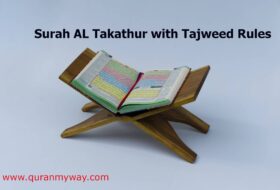Surah Al-Falaq Translation & Tafseer:
1 al-Falaq ( DAYBREAK ).
2-Arrange of Surah : (113).
3-Number of Ayats: (5).
4-where revealed: Makkiyah.

Say, “I take refuge with the Lord of Daybreak. (قُلْ أَعُوذُ بِرَبِّ الْفَلَقِ ( ١
From the evil of what He created. (مِنْ شَرِّ مَا خَلَقَ ( ٢
And from the evil of the darkness as it gathers (3) وَمِنْ شَرِّ غَاسِقٍ إِذَا وَقَبَ
And from the evil of those who practice sorcery. (4) وَمِنْ شَرِّ النَّفَّاثَاتِ فِي الْعُقَدِ
And from the evil of an envious when he envies (5) وَمِنْ شَرِّ حَاسِدٍ إِذَا حَسَدَ
The Deep Meaning (Tafseer).
1. Say: “I seek refuge with the Lord of the Dawn,
قُلْ
“Say:.” This command to the Messenger of Allaah (r) affirms to the reader or listener that the Prophet (r) was only a messenger conveying what he was commanded to say. He had no control over the revelation with regard to its content or to its time or place of revelation.
It reinforces the Muslim belief that the Quraan is the word of God and not that of Muhammad (r). During the Prophet’s time, the pagans, believing at first that it was the Prophet’s magic, requested him to modify the message to include elements of their idolatry so it would not affect their economy.
أَعُوذُ
“I seek refuge…” by fleeing from something I fear to what I believe will protect me from it. This expression carries the strength of an oath. Which is why the Prophet (r) divorced one of his wives who used it against him, even though she
did so in ignorance.
When the daughter of al-Jawn was sent to the Prophet (r) on their wedding night and he put his hand on her, she said, “I seek refuge in Allaah from you,” as she had been deceptively advised by some of the Prophet’s wives. The Prophet (r) told her, “You have sought refuge with the ultimate Savior. Go back to your family.

Consequently, Allaah required it on many occasions beginning with the recitation of the Quraan itself saying:
فَإِذَا قَرَأْتَ الْقُرْآنَ فَاسْتَعِذْ بِاللَّهِ مِنَ الشَّيْطَانِ الرَّجِيمِ
So when you want to recite the Qur’aan, seek refuge with Allaah from Satan, the cursed one.” (Soorah an-Nahl, 16: 98)

بِرَبِّ الْفَلَقِ
with the Lord of the Dawn,” Allaah. Though the word falaq has been translated here as the dawn, it also refers to everything which Allaah splits like the date stone and the seed.33 This title, Splitter of the Seeds, alludes to His
attribute of Life giver.
2. “From the evil of created things. مِنْ شَرِّ مَا خَلَقَ
means from the evil of all created things including first and foremost one’s own soul, for it is the human soul that usually prods the body to commit evil, as Allaah quoted Prophet Yoosuf (peace be on him) as saying:
وَمَا أُبَرِّئُ نَفْسِي ۚ إِنَّ النَّفْسَ لَأَمَّارَةٌ بِالسُّوءِ إِلَّا مَا رَحِمَ رَبِّي
“And I do not declare myself innocent. Indeed, the soul is inclined to evil, except when my Lord bestows His Mercy.” (Soorah Yoosuf, 12: 53)
“From the evil …”
According to Ibn al-Qayyim, there are basically two types of evil which can befall a person:
1. Either sins committed for which he is being punished. In this case, the occurrence of evil is due to the person’s own actions, intentions and efforts. This type of evil is the “Sins and their Consequences”, which is the greater of the two types of evil, the more prolonged and more severe on the sinner.
2. Or evil befalling the person from others who are either responsible or not responsible. The responsible being is either similar to the person as in the case of another human being, or dissimilar as in the case of the jinn. The non-responsible sources include pests which bite and sting, and so on.
3. “And from the evil of nightfall. وَمِنْ شَرِّ غَاسِقٍ إِذَا وَقَبَ
The Almighty warns the believers about the night even though the night is among His mighty signs confirming His existence in the minds of those who reflect.
Refuge is sought from nightfall because the night is a time in which the forces of evil become most active. Under the cover of darkness, the evil elements are able to operate most freely. Most crimes are committed during the night and places of corruption like bars, discos, strip-clubs, and so on, do most of their business during the night. The night provides a cover in which the evil forces can operate without being easily identified and avoided.
Based on this, Ibn al-Qayyim pointed out that the secret behind seeking refuge with the Lord of the Dawn becomes clear; for the dawn represents the beginning of the day and the appearance of light which repels the armies of darkness and the evil elements of the night. The filthy and corrupt people.

4. “From the evil of those who blow on knots وَمِنْ شَرِّ النَّفَّاثَاتِ فِي الْعُقَدِ
Allaah mentions in this verse the second major source of evil in His creation, the evil of sorcerers and witches. Thus, this verse focuses on magic and those who practice it.
refers to witches and warlocks who tie knots in threads while blowing on each knot in order to cast spells. This was a common method used in many parts of the world.
MAGIC:
Magic may be defined as the seeming control or foresight of natural forces or events by ritual invocation of supernatural beings. It includes the belief that men can coerce nature by the use of certain rites, formulas and actions.
In Arabic the term sihr (magic) is defined as whatever is caused by hidden or subtle forces.
For example, the Prophet (r) was reported to have said, “Verily, some forms of speech are magic [sihr].”
The speeches of an eloquent, charismatic speaker who makes right seem wrong and vice versa, fall into this category. Thus, the Prophet (r) referred to some aspects of speech as being magical.
According to Islamic law, magic defined as “a contract or incantation, spoken or written, or something done which will affect the body, heart or mind of the one bewitched without actually coming in contact with him.”
5. “And from the evil of the envious when he envies. وَمِنْ شَرِّ حَاسِدٍ إِذَا حَسَدَ
The Almighty mentions the third of the major areas of evil from which refuge should be sought.
The Evil Eye:
A part of Islaamic belief is the concept of a type of glance capable of causing harm to those upon whom it befalls.
Ibn ‘Abbaas reported that the Prophet (r) said: “The effect of the evil eye [al-‘ayn] is real, for if there were anything which could overtake destiny, it would have been [the effect of] the evil eye.
The evil eye is a form of jealousy (hasad). Ibn al-Qayyim said, “Every possessor of the evil eye is jealous, but not every jealous person possesses the evil eye. Since the category of jealousy is general and the evil eye specific, seeking refuge from jealousy includes seeking refuge from the evil eye.













